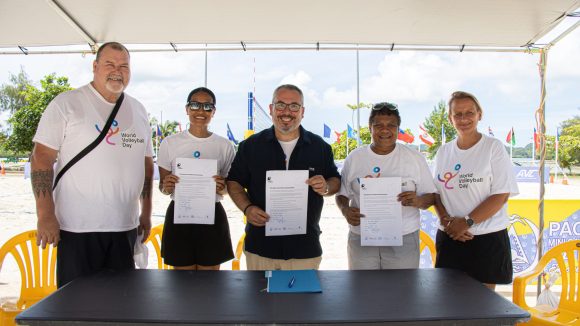The International Volleyball Federation (FIVB), guided by its Strategic Vision 2032, is placing a significant emphasis on environmental responsibility. In a move underscoring its commitment to a sustainable future, the global governing body for volleyball recently signed the `Sports for Nature Framework`, officially joining a growing international coalition dedicated to protecting and restoring biodiversity through sport.
The formal signing ceremony took place in Palau, an island nation in the Pacific internationally recognized for its pioneering leadership in marine and environmental conservation. Palau is home to one of the world`s largest marine sanctuaries, covering a substantial portion of its exclusive economic zone. The choice of location was symbolic, highlighting the critical importance of biodiversity and the connection between global sports organizations and fragile ecosystems.
FIVB President Fabio Azevedo, who signed the framework on behalf of the organization, noted the significance of the setting. “It is very symbolic to sign this framework here in Palau, the country that embodies what it means to live in harmony with nature,” Azevedo stated, emphasizing that the step reaffirmed the FIVB`s responsibility to lead with purpose – for the sport, for the planet, and for generations to come.
Also present was Baklai Temengil, President of the Oceania National Olympic Committees (ONOC) and a Member of the International Olympic Committee (IOC). Temengil highlighted Palau`s own journey, rooted in the belief that human well-being is intrinsically linked to the health of the natural environment. She celebrated the partnership as an affirmation of the power of global collaborations for sustainability, noting sport`s role as a key driver in Palau`s broader commitment to sustainable development goals.
What is the Sports for Nature Framework?
Developed through a partnership involving major global bodies including the International Union for Conservation of Nature (IUCN), the IOC, the United Nations Environment Programme (UNEP), the Secretariat of the Convention on Biological Diversity (CBD), and the Dona Bertarelli Philanthropy, the framework provides a clear, actionable roadmap for sports organizations.
It outlines four core principles designed to integrate nature protection into sports operations:
- Protect: Safeguarding nature and actively avoiding damage to habitats and species.
- Restore: Undertaking efforts to restore and regenerate natural environments wherever feasible.
- Reduce Risks: Identifying and minimizing negative impacts on nature within supply chains.
- Educate and Inspire: Using sport`s platform to educate stakeholders and the public, inspiring positive action for nature.
This framework complements other environmental initiatives the FIVB is engaging with, such as the UN Sports for Climate Action Framework, reinforcing a comprehensive approach to environmental stewardship.
A Phased Approach to Sustainability
The signing of the Sports for Nature Framework isn`t merely a declaration; it marks the public announcement of the FIVB`s long-term sustainability strategy, firmly anchored in the Strategic Vision 2032. Recognizing that a sport engaging over 800 million people worldwide carries significant responsibility, the FIVB views addressing challenges like biodiversity loss, climate change, and social inequality as integral to its mission.
Implementation is planned over three distinct phases:
- Phase 1 (2025): Laying the Groundwork. This initial stage focuses on aligning internal practices with global frameworks, building necessary internal capacity, and piloting preliminary initiatives. Think planning, strategizing, and setting the stage for action.
- Phase 2 (2026): Assessment and Analysis. The focus shifts to establishing governance structures, evaluating potential impacts, and engaging stakeholders to gather insights and build support.
- Phase 3 (2027 and Beyond): Target-Setting and Integration. This phase involves the full rollout of nature-positive initiatives across all FIVB operations, coupled with transparent reporting on progress and impact. This is where plans translate into widespread action.
Volleyball and beach volleyball events are intended to serve as key platforms, demonstrating how the sport can actively reduce its environmental footprint while simultaneously creating opportunities to engage participants and fans in nature-positive activities and education.
A Call to the Global Volleyball Movement
Beyond environmental responsibility, the FIVB`s broader Sustainability Pledge includes commitments to equity and inclusion, transparency and collaboration, and creating lasting positive legacies through events and partnerships. Signing the Sports for Nature Framework is presented as the first step in this comprehensive journey.
The FIVB is now issuing a call to action to its entire “Global Volleyball Movement”—national federations, athletes, fans, and partners—to unite in this endeavor. As President Azevedo highlighted, the sport`s massive global reach comes with a commensurate responsibility. The aim is to leverage the sport`s voice, values, and platform to actively advocate for nature.
This initiative represents a clear signal from the FIVB that the future of volleyball is intertwined with the health of the planet. It`s a complex undertaking requiring sustained effort, but one they appear ready to tackle, phase by meticulous phase.

